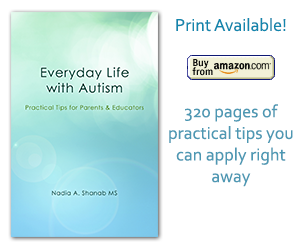Have You Planned For Your Child’s Summer Break Yet? (Part 2)
Nadia Shanab | autism, general advice, parenting, tips24 May 2015

As discussed in Have You Planned For Your Child’s Summer Break Yet? Part 1, having a daily schedule is pivotal to maintain a balanced life for your child and yourself. The only difference now is, that you are privileged to be the master and designer of this schedule.
Tips
- By now, your child has come a long way. She has learned a lot of information, accumulated different experiences, and acquired many skills over the last school year. Her brain has been actively well trained to receive, accept, handle, and assimilate new data. The progress she has gained needs a continuous maintenance to keep the inertia of the learning process running.
- To relinquish her schedule altogether for many weeks would be a regrettable waste. You, your child, and the entire family has invested so much time and effort to earn what you have achieved thus far. Picking up the learning speed won’t be very easy otherwise.
- Therefore, sticking to a schedule is a life-style for individuals with ASD. However, during vacation you can create a looser schedule. Read about the importance of a daily schedule here:
The Importance Of A daily Schedule.
Tips for creating a schedule
1- The schedule doesn’t have to be as academic oriented as the school’s, unless it’s your child’s mere choice.
2- Make the schedule as diverse and appealing as possible to encourage your child to abide by it.
3- Include the activities your child is interested in, whether academic, cultural, or physical.
4- Consult with your child, you’ll be surprised how many ideas she has in store for the summer break.
5- Take advantage of this break to develop the areas of strengths in your child, it might turn to be her career in the future.
6- Remember that our goal as parents and educators is to help the kids be as independent and sociable as possible. Vacation is a good time to do so.
7- Summer vacation is perfect to learn physical activities (swimming, surfing, boating, fishing, horseback riding, building sand castles, kicking beach ball,…)
8- Board games are great for vacations. Beside the fun they provide, they enhance speech, social skills, turn taking skill, and teach new concepts.
9- Arts and crafts activities are the kids’ favorite. While these activities engage the mind and the fine motors in a constructive and productive way, they also allow the kids to express themselves and communicate with the outside world. Many children with autism possess an artistic talents; let them dig it out.
10- Include cultural activities (visiting museums, aquariums, historic sites, performing arts theaters for children, stores for music instruments,…) she may discover her strength upon one of these visits.
11- Exposing your child to a palette of activities can open doors for new horizons.
Tip: Think of your child as an athlete (figurative), help her stay fit over the summer, to stand the long journey…
Keep your child’s mind hooked on the learning process all year long. An engaged mind will support the development (physical, social/emotional, and psychological) the child is going through.
Additionally, the transition later on into a new school year will be smooth and pleasant. Summer time is a great opportunity to practice social skills and meet new people. Keep your child connected with her community, she’ll need it later on.
The idea of having a routine during summer break is to keep the learning process going while she is still able to have fun. Create a schedule that is: creative, attractive, and productive.
Take the cues from your child, she’s your best guide.
Have a great summer!
nadia shanab
Tags: asperger's syndrome, autism, communication, discipline, flexibility, health, independence, music, occupational therapy, parenting, rules, schedule, social interaction, speech, transition
